
Linguistics Vanguard
Scope & Guideline
Championing the evolution of language and linguistics.
Introduction
Aims and Scopes
- Interdisciplinary Linguistic Research:
The journal emphasizes the integration of various linguistic subfields, including sociolinguistics, psycholinguistics, computational linguistics, and historical linguistics, fostering a comprehensive understanding of language phenomena. - Language and Identity:
Many papers focus on the relationship between language and identity, exploring how language shapes and is shaped by individual and collective identities, particularly in multicultural and multilingual contexts. - Technological Applications in Linguistics:
There is a strong focus on the application of technology in linguistic research, including the use of computational tools for data analysis, natural language processing (NLP), and the impact of social media on language. - Language Variation and Change:
The journal frequently publishes studies on linguistic variation, contact-induced changes, and the evolution of language, addressing both contemporary and historical perspectives. - Public Engagement and Outreach:
Linguistics Vanguard places a significant emphasis on community engagement and public-facing research, highlighting the importance of making linguistic research accessible to broader audiences. - Methodological Innovations:
The journal showcases innovative methodologies in linguistics, including experimental designs, corpus-based studies, and participatory research approaches, enhancing the rigor and relevance of linguistic investigations.
Trending and Emerging
- Impact of COVID-19 on Language:
A growing body of research examines how the COVID-19 pandemic has influenced language use, communication practices, and language maintenance, reflecting the immediate relevance of current global events. - Digital Communication and Social Media:
There is an increasing focus on how digital platforms and social media shape language practices, including code-switching, hashtag usage, and the evolution of online discourse. - Multimodal Approaches to Language:
Emerging studies are incorporating multimodal methodologies, exploring how language interacts with other modalities such as gesture, visual elements, and technology in communication. - Bilingualism and Language Contact:
Research on bilingualism and the effects of language contact is gaining prominence, particularly in contexts of migration and cultural exchange, highlighting the complexities of language use in diverse communities. - Community-Engaged Linguistics:
There is a notable trend towards community-engaged research, where linguistic studies actively involve the communities being studied, ensuring relevance and impact on local language practices.
Declining or Waning
- Traditional Linguistic Theory:
Papers grounded in traditional linguistic theories, such as strict generative grammar or classical phonetics, have become less prevalent, as researchers increasingly seek to incorporate interdisciplinary and empirical approaches. - Static Language Analysis:
There has been a noticeable decrease in studies that analyze language as a static system, with a shift towards dynamic and contextualized understandings of language use and change. - Limited Focus on Language Universals:
The exploration of language universals and typological studies has waned, reflecting a broader trend towards more localized and community-specific linguistic investigations. - Historical Linguistics in Isolation:
While historical linguistics remains a vital area, studies that approach it in isolation from contemporary sociolinguistic contexts have decreased, indicating a preference for integrative approaches. - Narrowly Defined Dialect Studies:
Research centered solely on narrow dialectal variations, without broader sociolinguistic implications or connections to language change, has seen a decline in interest.
Similar Journals
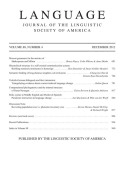
LANGUAGE
Cultivating a Rich Landscape of Language ResearchLANGUAGE, published by the Linguistic Society of America, is a premier academic journal dedicated to the rigorous study of linguistic theory and practice. With an ISSN of 0097-8507 and E-ISSN 1535-0665, this esteemed journal has established itself as a leading publication in the field of linguistics since its inception. The journal has consistently maintained a high impact factor, being ranked in the Q1 category in Linguistics and Language for 2023, placing it among the top tier of academic journals. Notably, it also holds impressive Scopus rankings, being positioned at #75 out of 1088 in Arts and Humanities, and #89 out of 1167 in Social Sciences, demonstrating a significant impact and reach in the discipline. While it is not an open-access journal, LANGUAGE provides crucial insights into linguistic research, fostering a vibrant academic community. Spanning years from 1996 to 2024, it continues to be an essential resource for researchers, professionals, and students alike, aiming to advance the understanding of language in its myriad forms and functions.
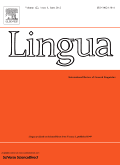
LINGUA
Exploring the depths of language and communication.LINGUA is a premier academic journal dedicated to the field of linguistics, published by ELSEVIER and based in the Netherlands. With an ISSN of 0024-3841 and an E-ISSN of 1872-6135, this esteemed journal has garnered a reputation for excellence, evidenced by its position in the top Q1 quartile in Linguistics and Language as of 2023. LINGUA serves as a vital platform for scholars, researchers, and students, showcasing innovative research and critical discussions across various linguistic subfields. The journal has demonstrated impressive Scopus rankings—151 out of 1088 for Language and Linguistics, and 176 out of 1167 in Social Sciences—placing it in the 86th and 84th percentiles, respectively. By providing a forum for the dissemination of advanced linguistic theories and their applications, LINGUA continues to significantly contribute to the academic community, making it an essential resource for anyone engaged in the study of language.

REVUE DE LINGUISTIQUE ROMANE
Connecting Cultures Through Linguistic InsightsREVUE DE LINGUISTIQUE ROMANE, published by the esteemed SOCIÉTÉ LINGUISTIQUE ROMANE, is a prominent academic journal dedicated to the exploration of Romance linguistics. With its ISSN 0035-1458, the journal plays a significant role in advancing knowledge within the fields of linguistics and the history and philosophy of science. Although it does not currently offer Open Access, it provides critical insights and peer-reviewed research that are indispensable for scholars, educators, and students interested in the nuances of Romance languages. The journal, which has seen converged coverage from 2006 to 2017, and then again from 2019 to 2021, is ranked in the third quartile (Q3) across various categories within Scopus, reflecting its established presence in the academic community. As a vital resource for interdisciplinary studies, REVUE DE LINGUISTIQUE ROMANE is instrumental for those seeking to deepen their understanding of linguistic structures, cultural nuances, and the historical development of Romance languages.
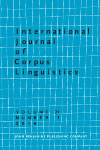
International Journal of Corpus Linguistics
Exploring Linguistic Patterns with PrecisionThe International Journal of Corpus Linguistics, published by John Benjamins Publishing Co, is a premier academic journal dedicated to advancing the field of corpus linguistics. With an ISSN of 1384-6655 and an E-ISSN of 1569-9811, this journal serves as a pivotal platform for researchers and practitioners alike to explore the intricate relationships between language and corpora. Housed in the Netherlands and operating within the prestigious Q1 category in Linguistics and Language, the journal boasts impressive Scopus rankings, positioning it in the top percentiles of both Arts and Humanities and Social Sciences. Its commitment to rigorous peer-reviewed scholarship not only enhances understanding in the domain but also fosters collaboration among scholars. With coverage spanning from 1996 to 2024, the journal publishes cutting-edge research that contributes valuable insights into linguistic patterns and empirical studies. Whether you're an established researcher or a student embarking on your academic journey, the International Journal of Corpus Linguistics is an essential resource for anyone seeking to deepen their understanding of language through corpora.

RLA-Revista de Linguistica Teorica y Aplicada
Exploring the intersections of theory and application in linguistics.RLA-Revista de Linguística Teórica y Aplicada, published by Universidad de Concepción, Facultad de Humanidades y Arte, stands as a vital resource in the field of linguistics, delivering cutting-edge research and scholarly articles that contribute to both theoretical and applied linguistics. With its ISSN 0718-4883, this journal aims to foster robust discussions and innovations in linguistic theory, language acquisition, sociolinguistics, and applied linguistics methodologies. Although the journal currently does not provide open access options, it endeavors to reach a diverse audience, including researchers, professionals, and students, who are keen to explore the rich tapestry of language studies. By offering insights from both local and global perspectives, RLA does not only advance linguistic discourse but also encourages interdisciplinary collaboration, thereby solidifying its role as a pivotal publication in the linguistic academic community.
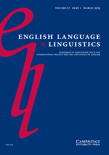
English Language & Linguistics
Exploring the Depths of Language and LinguisticsEnglish Language & Linguistics is a prestigious journal published by Cambridge University Press, specializing in the dynamic fields of linguistics and language studies. With an impressive Q1 ranking in both Linguistics and Language categories for 2023 and a notable placement in the Scopus metrics, where it ranks #142 out of 1088 in Arts and Humanities, the journal is recognized for its high-quality research contributions and robust impact in the scholarly community. Since its inception in 1997, English Language & Linguistics has provided a forum for researchers to explore various aspects of language, facilitating the dissemination of innovative ideas and empirical studies. With no open access options currently available, the journal remains a valuable resource within the United Kingdom and beyond, fostering a deeper understanding of language intricacies and their broader societal implications. For practitioners and academicians alike, this journal is a critical resource for keeping abreast of the latest advancements in linguistics.
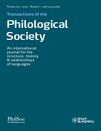
TRANSACTIONS OF THE PHILOLOGICAL SOCIETY
Advancing the Frontiers of Linguistic ScholarshipTRANSACTIONS OF THE PHILOLOGICAL SOCIETY, published by Wiley, is a prestigious journal focusing on the fields of linguistics and language studies. With a rich history that spans over 180 years, having been established in 1842, this journal continues to contribute significantly to the academic discourse on language and linguistics. It holds an impressive impact factor and ranks in the Q2 category for both Linguistics and Language in the 2023 category quartiles, underscoring its relevance and scholarly influence, as evidenced by its rankings in the Scopus database. Researchers, professionals, and students will find this journal invaluable for accessing high-quality research articles that illuminate various aspects of language and linguistics. While the journal does not currently offer open access, it remains a vital resource for anyone dedicated to advancing knowledge in these fields. Its address in the United Kingdom underscores its international reach and commitment to academic excellence.

Rasprave
Advancing linguistic knowledge through open dialogue.Rasprave is a distinguished open access journal published by the Institute of Croatian Language and Linguistics in Croatia, dedicated to advancing the field of linguistics and language studies. With an ISSN of 1331-6745 and E-ISSN 1849-0379, the journal has embraced open access since 2007, making its research widely available to scholars globally. It holds an important position in the academic community, particularly noted for its 2023 Scopus ranking within the Arts and Humanities and Social Sciences categories, falling into the 59th and 56th percentiles respectively. The journal’s impact is further reflected in its Q3 quartile ranking in linguistic and language studies, showcasing its relevance and growing influence in this vibrant field. Rasprave aims to publish innovative research that deepens understanding of language dynamics, linguistic theory, and sociolinguistics, making it an essential resource for researchers, professionals, and students seeking to enrich their knowledge and contribute to the academic discourse surrounding language.

Cadernos de Estudos Linguisticos
Empowering knowledge through accessible linguistic research.Cadernos de Estudos Linguisticos, published by UNIV ESTADUAL CAMPINAS, INST ESTUDOS LINGUAGEM, stands as a pivotal platform in the field of linguistic studies since its inception in 1978. With its commitment to Open Access, this journal fosters the dissemination of cutting-edge research, ensuring that knowledge is accessible to a global audience. This also enhances collaboration among researchers, professionals, and students dedicated to exploring the nuances of language. The journal proudly carries the ISSN 0102-5767 and E-ISSN 2447-0686, attesting to its uninterrupted quality and relevance in linguistic scholarship. By addressing various facets of language studies, including syntax, semantics, and sociolinguistics, this esteemed journal is a vital resource for advancing understanding and innovation in the field.

NEUPHILOLOGISCHE MITTEILUNGEN
Advancing Philological Insights Since 1971NEUPHILOLOGISCHE MITTEILUNGEN, published by the esteemed Modern Language Society, stands as a significant contribution to the domain of Language and Linguistics. With a history dating back to 1971, this journal has consistently provided an academic platform for researchers and scholars, navigating through the intricacies of philology and linguistic studies. Although it is indexed in Scopus with rankings reflecting its position in the Arts and Humanities and Social Sciences categories, it currently does not offer Open Access, which may require interested parties to seek institutional access for its wealth of content. The journal has experienced periods of coverage discontinuation in recent years, yet it remains a valued source for advancing the understanding of language theories and linguistic practices. Its location in Helsinki, Finland, offers a unique European perspective on global linguistic issues. The journal is ideal for those looking to engage with evolving linguistic trends and contribute to contemporary discussions in the field.